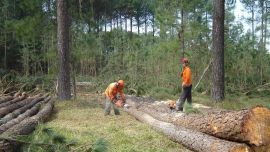The knowledge economy is growing at rapid speed in Argentina, adding value to the nation’s exports. The software industry currently employs 120,000 people and the government hopes to grow that figure to half a million employees by 2030.
“The qualitative leap which Argentina has to give is to export intellectual property,” Knowledge Economy Undersecretary María Apólito said in an interview.
In what areas of the knowledge economy does Argentina have the most potential to compete with the world?
We have a great deal of potential in software. We are Latin America’s leading software exporter, [the] product of a law which lasted 15 years [2004-2019], placing the sector in a position of advantage with respect to other areas of the knowledge economy which it will be necessary to consolidate and support.
Another area which seems to me to have many possibilities is biotech. Argentina has great potential in the three main fields where biotech is applied: human and animal health and farming. In the satellite industry we are also now very competitive because we manage almost the entire value chain – the only part missing is the launching-pad but in everything to do with satellites, from the design to the manufacture of the components and the assembly, we have a very consolidated chain of production.
The common denominator to these three areas has been state policies transcending changes of government. When things are done well beyond political colours, Argentina has relevant comparative capacities. We had an important satellite plan which lasted many decades, a Biotechnology Law which started in 2007 and a Software Law which emerged in 2004.
Are human resources the main asset Argentina has for creating knowledge companies?
Yes, the current and potential human resources are fundamental. We have an excellent public university system which is free and has always generated very good human capital. We have quality infrastructure – practically 80 percent of Argentine territory has connectivity. For the companies exporting knowledge-based services, the different time zone is also favourable for being able to work for countries demanding such services. And we have a consolidated system of science and technology.
It is important not only to export working hours, development or consultancy but also to export intellectual property and patents. The qualitative leap which Argentina has to give is not to export more outsourcing from foreign companies and then having to buy a software patent which contains Argentine knowledge input and which was also sustained by the state for years via public education and subsidies for science and technology. The same could happen to us with medicine and vaccines.
In Argentina poverty reaches 42 percent with six of every 10 children impoverished. In the past three years there has been an economic recession with the social crisis accentuated by the pandemic. This will have an impact on education. Those human resources, that talent on which the knowledge economy feeds, are they in danger in the future?
I don’t think they are in danger but we do have to do something urgently. The Productive Development Ministry is deeply concerned that Argentina comes out of this situation with more jobs and for that we need more production.
Faced with that, there are short-term strategies to resolve urgent questions of inclusion for those not on the job market today, above all youth. Last year we launched the 'Plan Argentina Programa, which is free and gives everybody the possibility of learning to programme in the basic languages demanded by today’s software industry. We were saying that there were 10,000 openings. At the moment we have 7,000 people doing the catch-up course and next week we are launching the first cohort of those who are going to do the programming languages. Last year 166,000 people were registered in just four days.
If we could get today’s jobless youth to learn to programme, they would have a quality job. In this type of company, the starting salary averages three-and-a-half minimum wages. It would be something really revolutionary because it would also motivate other neighbourhood kinds when they see their pals earning money without getting into trouble or awaiting a social plan. We have the possibility of getting them out of that situation and also supplying the resources which the industry needs to keep growing.
What is Argentina lacking to have more companies – financing, deeper capital markets or regulations to create new industries?
Today we have 464 companies registered and awaiting final evaluation for the Registry [of the Knowledge Economy Law, Régimen de la Ley de Economía del Conocimiento] according to the legal requisites, of which slightly more than half come from the Software Law. Of these around 280 companies are biotech while there is also Industry 4.0, the satellite industry, audio-visual production, professional and geological services and services for research and development.
The Registry is attractive because in a short time we will be granting benefits with a stability of 10 years. Once we have stabilised the macro-economy, the dollar, the foreign debt and all the rest of it, Argentina’s context for attracting investments will be important.
We already have a good scheme of tax incentives, a favourable exchange rate and human resources which are bearing their fruits – many companies have announced investments and have taken on people in the provinces which is also one of our great goals, to have a federal knowledge economy.
The ban on salmon farming in Tierra del Fuego triggered fierce debate. You mentioned on social networks that the Argentine biotech company Tecnovax solved sanitary problems for Chilean aquiculture. How did they do it?
It’s a company which makes biotech products for animal health in general. I don’t know if they started off developing antibiotics which then ended up as vaccines. The first treatment was against the ISA virus, which was then in Chile, and then they continued making different types of biological formulas for other viruses which started appearing. They exported it to Norway, Denmark and other countries engaged in aquiculture. Our minister Matías Kulfas is concerned that instead of banning, people should be thinking of a production where the environment is respected while diversifying the economy.
The global market is moving in a direction where companies are incorporating more technologies and standards of production which protect the environment. Why does Argentina still have this tension between development and environmental thinking?
We must have had for years the same model of development. We’re lacking this debate to balance an economically valid industrial model for our country with environmental questions. This Ministry is working on a law of electro-mobility to take out some lines to favour the transition of energy towards green hydrogen, there’s a line of thinking in that direction.
Jobs
◆ The software industry has 120,000 employees in Argentina, with an unsatisfied demand of 10,000 jobs a year.
◆ At least 323,000 people are dedicated to professional services for export.
◆ Before the pandemic, biotech employed 40,000 workers.
◆ The audio-visual industry creates 9,000 jobs.
◆ There are 464 companies registered in the Registry of the Knowledge Economy Law (Régimen de la Ley de Economía del Conocimiento – certificate granting tax benefits for select companies/tax-payers – under regulations, they must be registered).





















Comments